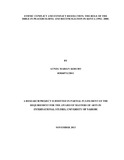| dc.contributor.author | Kerubo, Aunda M | |
| dc.date.accessioned | 2013-11-15T13:14:34Z | |
| dc.date.available | 2013-11-15T13:14:34Z | |
| dc.date.issued | 2013-11 | |
| dc.identifier.citation | Kerubo,Aunda M.;November,2013.Ethnic Conflict And Conflict Resolution: The Role Of The Bible In Peacebuilding And Reconciliation In Kenya (1992– 2008). | en |
| dc.identifier.uri | http://erepository.uonbi.ac.ke:8080/xmlui/handle/123456789/59188 | |
| dc.description.abstract | This study has examined the universal phenomenon of ethnic conflict. The main purpose
was to identify what the bible teaches on peacebuilding and reconciliation and establish
its role in conflict resolution. In order to achieve this purpose, the study first developed a
conceptual framework that would enable the explanations of the triggers of ethnic
conflict and the factor that stimulates the triggers into violent ethnic conflict. Political
manipulation in times of real or anticipated political change emerged as the factor that
stimulated triggers of ethnic conflict. The study also developed a conceptual framework
to explain when conflict mechanisms were introduced in Kenya how they were used and
if they were used successfully. The framework explained that conflict resolution
mechanisms were introduced when the ugly ethnic consequences of ethnic conflict had
been realised already. The conflict resolution mechanisms that were used were not
successful. The bible, while it has rich and manifold resources that can be used in conflict
resolution, it was not adequately used to resolve ethnic conflict, to build peace and to
reconcile diverse Kenyan ethnic groups.
The research method used in this study was both primary and secondary research
methods. The two methods were used for the purpose of verifying and validating the
findings of each method. Alongside the two methods, the research also used the
qualitative research method, which was deemed useful for this research, especially in
analysing data. The theoretical framework that involved this study was the social identity
theory and the sociology of knowledge. The two theories have been proven useful in
bring groups of people which were at odds with each other at one. The findings reveal
that the primary data and secondary data collaborated to a larger extent and so the
research was able to meet its objectives and test and prove its hypotheses in the
affirmative. The findings were that the bible was a useful manual against negative
ethnicity and a useful tool for ethnic reconciliation. | en |
| dc.language.iso | en | en |
| dc.publisher | University of Nairobi | en |
| dc.title | Ethnic Conflict and Conflict Resolution: the Role of the Bible in Peacebuilding and Reconciliation in Kenya (1992– 2008) | en |
| dc.type | Thesis | en |
| local.publisher | College of Humanities and Social Sciences | en |

